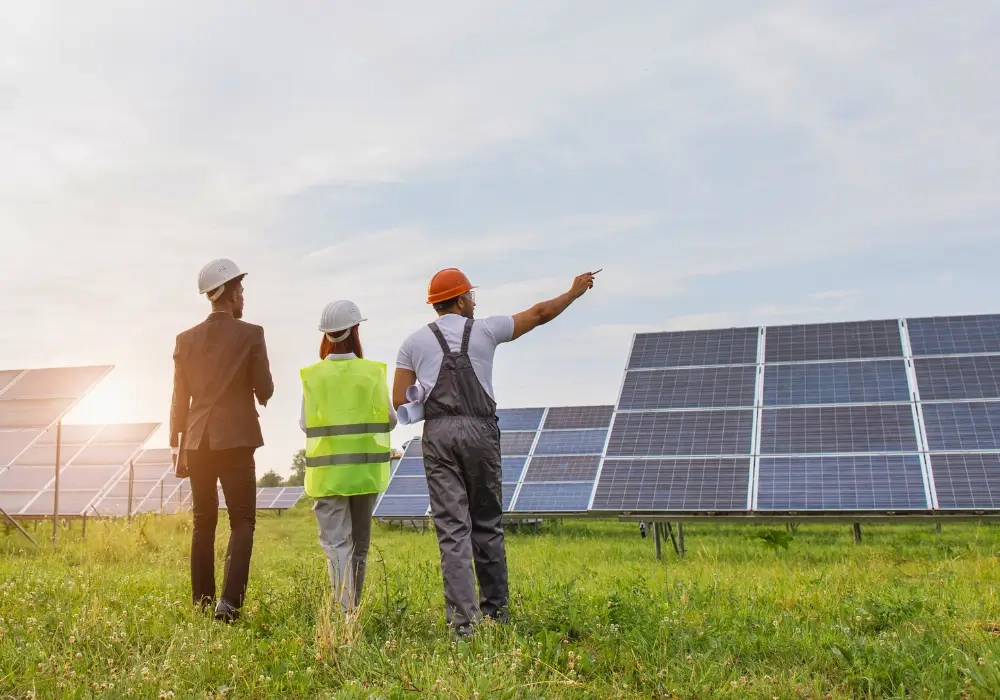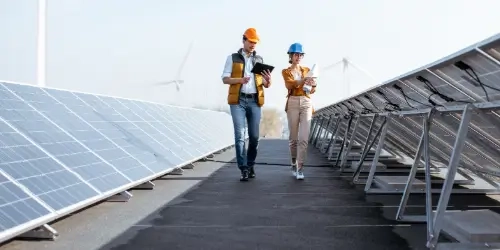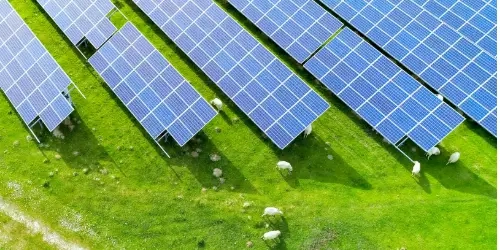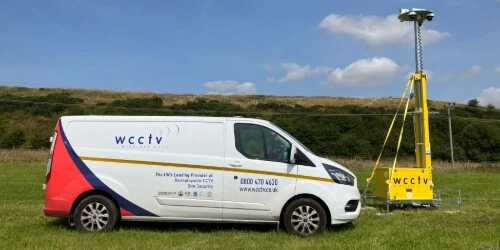Between 2024 and 2025, an estimated £6.3 billion has been invested in renewable infrastructure. As of February 2025, the UK now has 18GW of solar capacity spread across 1,735,000 nationwide solar installations, a 6.8% increase from the previous year.
But this rapid expansion comes with rising solar site crime risks. Remote solar sites are increasingly targeted by thieves and vandals, leading to costly disruptions, downtime and delays that threaten the UK's progress toward clean energy targets.
In this guide, we'll break down the biggest crime risks UK solar farms face today and explain why comprehensive solar farm security is more vital than ever.
Why Are UK Solar Farms Often Located in Remote Locations?
Many solar farms across the United Kingdom are developed in remote locations due to a combination of environmental, practical and regulatory reasons.
Land availability and cost considerations
Large-scale solar installations require extensive areas of relatively flat, unshaded land that can accommodate thousands of solar panels and critical infrastructure. These locations are significantly cheaper and more readily available outside urban centres.
Planning permissions and visual impact
Large solar farms (above 50 MW) are classed as nationally significant projects (NSIPs), requiring permission from the relevant planning departments. In England, this typically involves the local planning authority (LPA).
Remote areas tend to face fewer planning objections than built-up locations, as situating solar farms away from residential zones reduces their visual impact on communities. This often makes obtaining and maintaining planning consent easier in less populated areas.
Grid connection points
Some remote areas are positioned near existing high-voltage transmission lines and electrical substations that can handle large-scale solar feeds. These grid connection points allow solar farm operators to transfer generated solar power into the national network more efficiently.
While remote locations are perfect for solar farms, they also create significant security vulnerabilities and expose operators to increased solar farm crime risks.
Is Solar Farm Crime Truly on the Rise in the UK?
Solar farm crime rates have reached an all-time high across the UK, with police reports painting a vivid picture of escalating theft and organised criminal gangs targeting renewable energy plants.
Here are a few key figures to highlight these solar site crime trends:
- 2021-2022: Police recorded a 48% increase involving solar panels and copper cabling theft.
- 2023: West Mercia police recovered 550 stolen solar panels worth over £100,000 in Gloucestershire, which were originally stolen from a farm in Worcestershire.
- 2023: An estimated 75,000 to 100,000 solar panels were stolen from a Northumberland solar farm in a single organised criminal operation.
- 2023: 80 solar PV panels valued at over £10,000 were dismantled and stolen from a site in Wellingborough, England.
- 2023-2024: According to Aviva crime data, repeat targeting of solar farms is becoming increasingly common. One solar site suffered four thefts in six weeks between December 2023 and February 2024, with total losses amounting to £250,000+.
- 2024: 2 large reels of copper cabling were stolen from a commercial solar site in West Yorkshire.
- 2025 (April): Copper cabling was stolen from a solar installation in Lancaster, continuing the trend into this year.
- According to NFU Mutual's 2025 report, rural crime cost the UK £4.4 million in 2024.
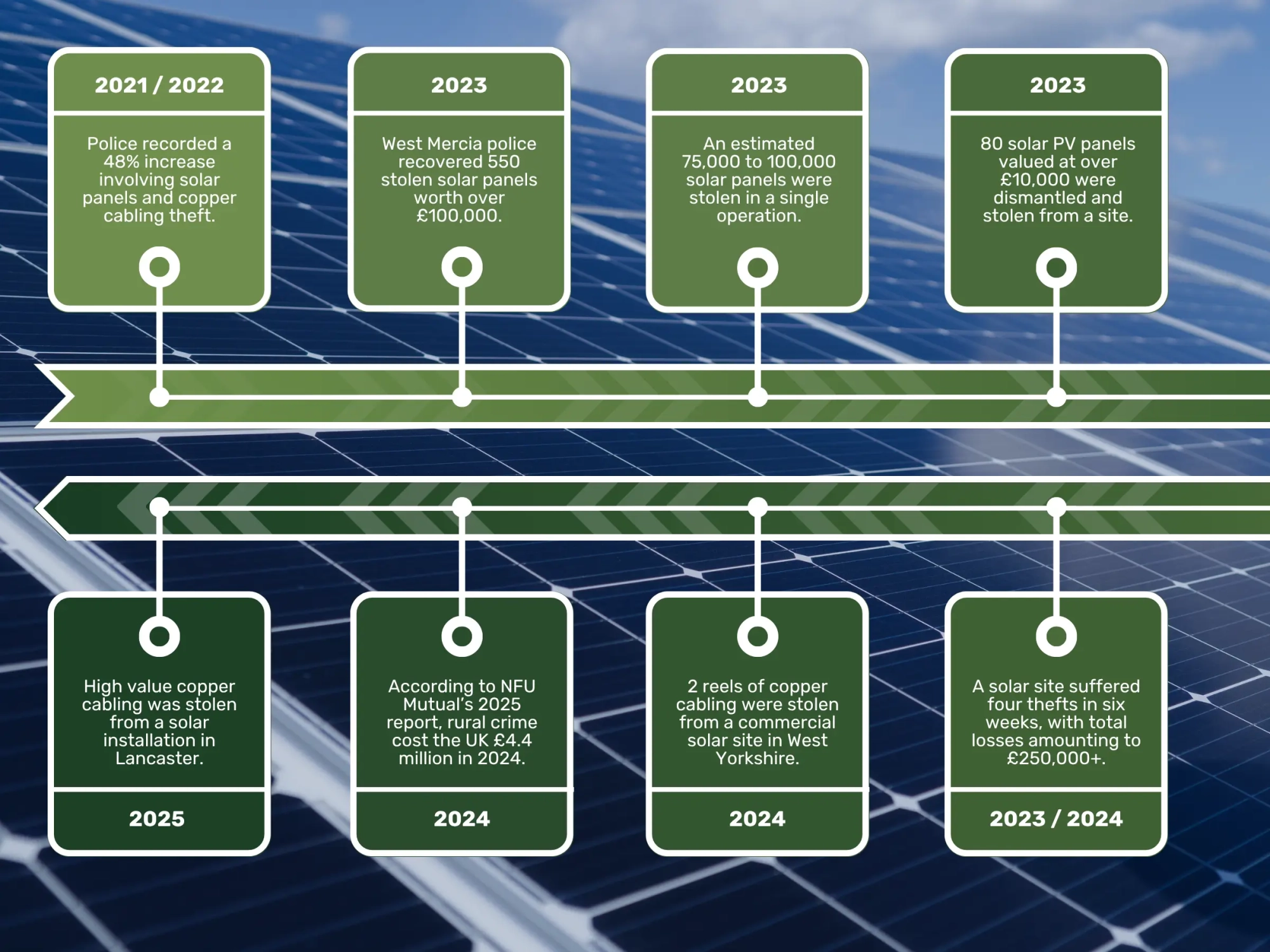
These alarming solar theft trends highlight just how serious solar farm crime is in the UK.
The cost of solar theft extends far beyond replacing panels or cables. Operators are facing lost revenue during downtime, reactive repair expenses that impact ROI and higher insurance premiums.
With criminals now systematically targeting sites and returning to previously hit locations, reactive security measures no longer suffice. Preventative site security solutions, such as CCTV Towers, are now vital to deter theft and protect your investments.
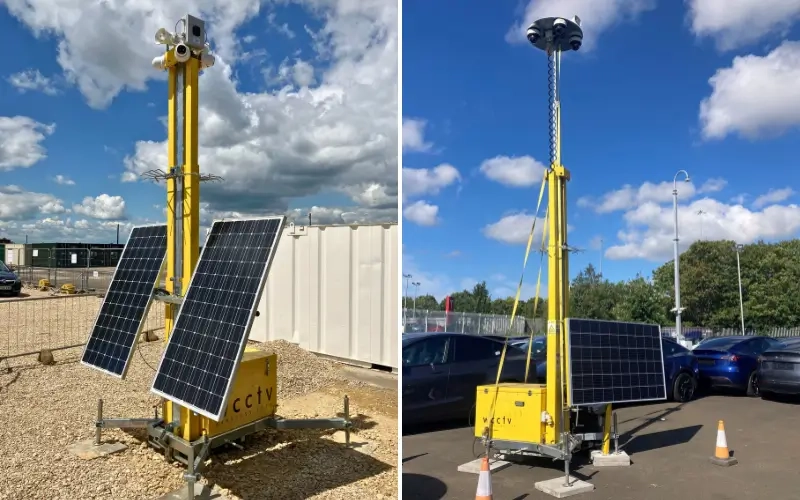
What Makes UK Solar Farms a Target for Criminals?
Remote solar farms and development sites make the ideal target for potential intruders because they contain high-value assets, are often located in isolated areas and generally lack proper security systems. This combination makes them "soft targets" for both opportunistic thieves and organised criminal gangs.
High-value assets
Solar farms contain a range of valuable equipment, such as copper cabling, solar panels, battery storage units and inverters. These items are commonly stolen from rural installations due to their high resale value on illicit markets.
For example, 30 kW commercial-grade solar systems can cost anywhere between £35,000 and £40,000, while 110 kW three-phase inverters are priced at around £5,000 excluding installation.
Additionally, copper is a highly sought-after metal used across multiple industries, including renewable energy farms and development sites, making it an attractive target for criminals due to its high demand.
In 2024, metal prices rose by 3.88% alone, and global demand for copper is projected to grow by as much as 70% by 2050. This growing value makes copper cable theft a lucrative venture for criminals, putting solar farms at even greater risk.
Isolation
Most solar farms are situated in remote, rural areas where physical security is limited and emergency response times are slower. These isolated settings give criminal gangs ample time and space to operate without immediate detection or interruption.
Unlike traditional "lock-and-go" businesses, clean energy sites are spread over wide, open spaces and cannot be locked behind doors. This lack of protection, combined with minimal on-site personnel, poor security systems and inadequate perimeter fencing, creates the perfect conditions for criminal activity.
Inadequate security systems
Many solar farms were designed when solar crime rates were lower, with operators relying on remote locations for protection. This has created "soft targets" where criminals exploit weak security measures to access valuable assets.
Furthermore, organised criminal gangs have become more sophisticated in their operations, often using drone surveillance to scout solar sites before initiating a strike. Thieves have also been known to conduct initial "testing" of site security by cutting fences to assess response times before undertaking larger heists.
High-value items, isolated locations and weak site security all leave solar farms open to theft, which is why solar farm operators can no longer rely on location alone. It's time to take security seriously and put proper measures in place to protect your valuable assets.
How Can Solar Farm Operators Protect Their Assets?
Solar farm operators can protect assets by taking a multi-layered, integrated security approach that combines physical barriers and advanced monitoring systems.
Secure perimeters
Your site's perimeter is your first line of defence when it comes to preventing solar crime.
- High-security fencing, such as LPCB SR4-rated mesh, provides a physical barrier to deter and delay unauthorised entry.
- Reinforced gates with controlled access points and anti-tamper padlocks make it significantly harder for intruders to gain access and take off with stolen equipment.
- Advanced perimeter technologies like ANPR (automatic number plate recognition), perimeter intrusion detection (PID) systems, motion-sensor lighting and Temporary CCTV Cameras help deter, detect and respond to threats in real-time.
- Natural screening, such as retaining vegetation around perimeter areas, helps shield valuable infrastructure from view, reducing the likelihood of vandalism and theft.
- Routine perimeter checks allow operators to identify signs of tampering or security vulnerabilities before a major theft occurs.
Smart surveillance, monitoring and response
- 24/7 CCTV Tower surveillance: High-quality, purpose-built CCTV systems provide near-360° site coverage and act as a visible deterrent on solar farms. They capture high-resolution footage and include infrared night vision and Pan-Tilt-Zoom (PTZ) capabilities for active, 24/7 monitoring.
- Thermal CCTV Solar Towers: Using thermal and optical cameras to detect criminal activity, these solar-powered CCTV systems can see up to 200 metres in darkness, dust and fog.
- Temporary CCTV Solutions: Suitable for any solar project, Redeployable CCTV systems offer flexible, short-term protection for high-risk sites. Available on a rental basis, these units are ideal for securing vulnerable locations during construction or periods of increased threat.
- Remote Monitoring Services: Allows live NSI Gold-accredited monitoring centres to observe your surveillance cameras in real-time, assess motion-triggered events and take immediate action when security threats are detected.
- Mobile Keyholding and Alarm Response: Ensures trained security professionals attend your site when a security alert is triggered, initiate an immediate response and provide detailed incident reports. Our fully-managed service ensures your site is protected at all times, removing the burden from your operations team.
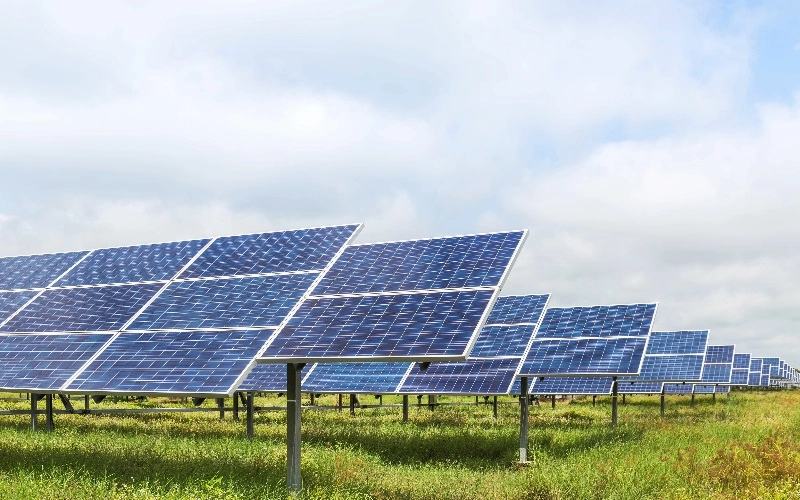
Why Partnering with Security Experts is Essential
Securing remote solar farms and development sites requires specialist expertise that goes beyond standard security measures.
Here's a breakdown of what our fully-managed service includes:
- Rapid Deployment CCTV Systems: Solar farm security needs can change quickly, from responding to increasing threats to protecting sites during construction phases. Our Temporary CCTV solutions provide flexible protection that can be deployed within 20 minutes (for standard setups).
- Mobile and autonomous operation: Rural areas often lack mains power and internet connectivity, requiring security systems that work autonomously. Our solar-powered surveillance and PID systems, like the Hornet, ensure day-to-night protection for off-grid sites.
- Fully-managed service: We secure rural solar farms with innovative solutions that remove the burden of security management from operators. From initial site assessments and installation to system configuration and remote diagnostic testing via our Heartbeat software, we are the critical infrastructure company you can rely on.
- Cost-effectiveness: Our solar farm security services cost up to 88% less than traditional manned guarding, giving you professional protection at a fraction of the price.
- Proven experience: With 6 regional hubs across the country and over 20-years of experience, we are the UK's leading supplier of rapidly installed, mobile CCTV systems.
Protect the UK's Green Energy Future with WCCTV Today
The increased crime wave for rural solar farms creates a serious challenge when it comes to achieving the nation's Net Zero targets.
However, by investing in proper security planning and professional monitoring systems, these risks can be greatly reduced.
WCCTV is the market-leading manufacturer and supplier of Rapid Deployment CCTV systems, specifically designed for temporary security or targeted surveillance applications.
Don't manage your security alone; reach out and protect your valuable solar assets with us today.
